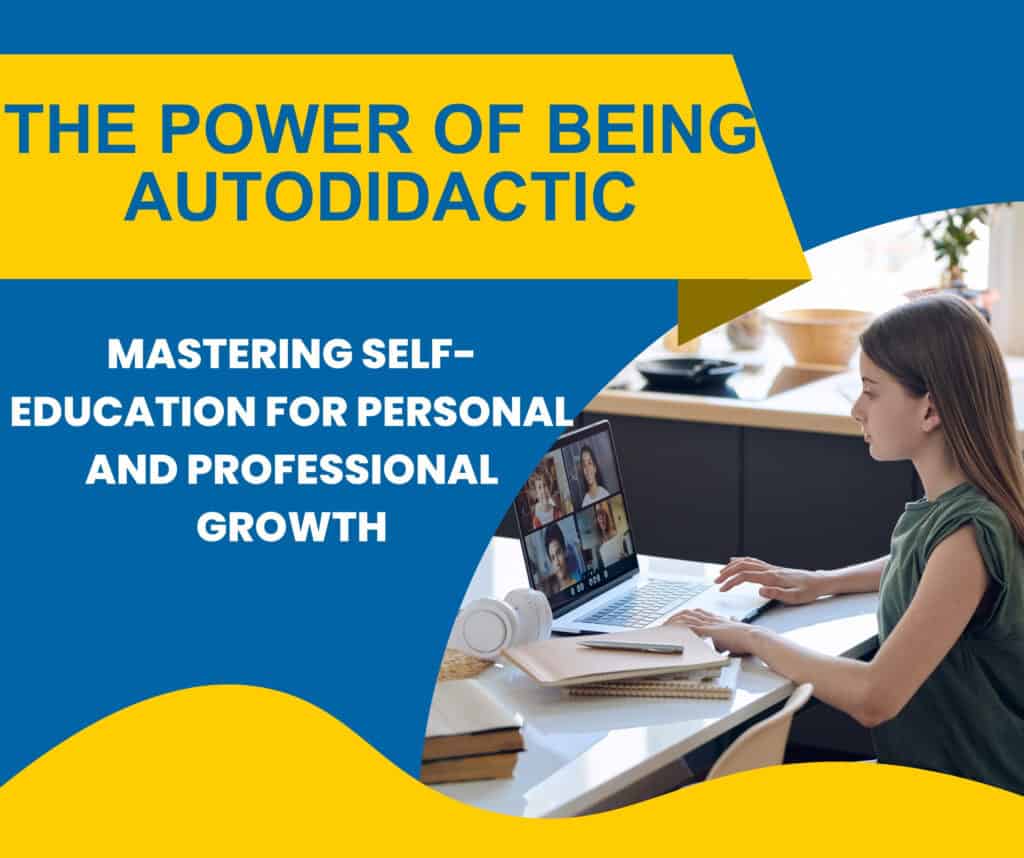In an ever-evolving world, the ability to learn independently has become more crucial than ever. This concept of self-directed learning, known as being “autodidactic,” refers to the practice of acquiring knowledge and skills through one’s own efforts, without the direct guidance of formal education systems. Being autodidactic means taking control of your learning journey, driven by curiosity, determination, and a passion for knowledge.
The importance of self-education has surged in the modern world, where information is readily accessible, and the pace of change in industries demands constant upskilling. Traditional education systems often struggle to keep up with the rapid advancements in technology, leaving gaps that can only be filled by proactive learning. Whether you’re looking to pivot in your career, develop new hobbies, or stay ahead in your field, being an autodidact empowers you to adapt and thrive in any environment.
This article will explore what it means to be autodidactic, delve into the benefits of self-directed learning, and provide practical strategies for developing autodidactic skills. We’ll cover the flexibility and cost-effectiveness of self-education, the importance of critical thinking, and how to effectively manage your learning journey. By the end of this article, you’ll have a clear understanding of how to harness the power of self-education for personal and professional growth.
Start your online business today. Click below to begin
Try Wealthy Affiliate (For Free).
What Does Autodidactic Mean?
Definition of Autodidactic
The term “autodidactic” comes from the Greek words “autos,” meaning “self,” and “didaktikos,” meaning “teaching.” It describes a person who teaches themselves new skills or knowledge without the direct instruction of a teacher or formal education system. Autodidacts are self-motivated learners who rely on their curiosity, resourcefulness, and dedication to guide their educational journey. They take responsibility for their own learning, setting their own goals, finding resources, and determining the pace at which they progress.
Historical Examples of Famous Autodidacts
Throughout history, there have been many notable figures who achieved greatness through self-education. These individuals exemplify the power of autodidacticism and its potential to drive innovation, creativity, and success.
- Leonardo da Vinci: Renowned as a painter, scientist, and inventor, Leonardo da Vinci was largely self-taught in many of the disciplines he mastered. His insatiable curiosity led him to study anatomy, physics, and engineering, making groundbreaking contributions that still resonate today.
- Benjamin Franklin: One of the Founding Fathers of the United States, Franklin was an avid autodidact. Despite having limited formal education, he taught himself a wide range of subjects, including science, politics, and languages. His self-education played a pivotal role in his accomplishments as a statesman, inventor, and writer.
- Thomas Edison: Often described as America’s greatest inventor, Edison had little formal schooling. However, his natural curiosity and drive to understand how things worked led him to become a prolific inventor. He held over 1,000 patents, including for the phonograph and the electric light bulb.
- Malcolm X: A prominent civil rights leader, Malcolm X educated himself during his time in prison, reading extensively on history, philosophy, and religion. His self-directed learning transformed him into a powerful speaker and thinker, playing a significant role in the American civil rights movement.
The Difference Between Formal Education and Self-Education
While formal education involves structured learning within a classroom setting, guided by educators and based on a predefined curriculum, self-education is driven by personal initiative and curiosity. Here are some key differences:
- Structure vs. Flexibility: Formal education follows a set curriculum with specific learning outcomes, assessments, and timelines. Autodidacticism, on the other hand, allows learners to set their own goals, choose their own resources, and learn at their own pace. This flexibility enables autodidacts to delve deeply into areas of personal interest or rapidly acquire skills needed for a specific purpose.
- External Guidance vs. Self-Direction: In formal education, teachers, professors, or mentors provide instruction, feedback, and guidance. Autodidacts, however, are their own teachers. They must be self-motivated, resourceful, and disciplined to succeed without external supervision.
- Assessment vs. Application: Formal education typically involves regular assessments, such as exams and assignments, to measure progress and understanding. In self-education, the focus is often more practical, with learners applying what they’ve learned directly to real-world situations, projects, or problems.
- Resource Availability: Traditional education often relies on textbooks, lectures, and other materials provided by institutions. Autodidacts have the freedom to explore a vast array of resources, from books and online courses to podcasts, videos, and hands-on experiences. The internet has made an enormous amount of information accessible, enabling autodidacts to learn just about anything from anywhere.
Benefits of Being Autodidactic
Becoming an autodidact offers a wide range of benefits that can enhance both personal and professional growth. These advantages make self-directed learning an attractive option for those who wish to take control of their education and adapt to the fast-paced demands of the modern world. Below, we explore some of the key benefits of being autodidactic.
Flexibility in Learning
One of the most significant benefits of being autodidactic is the unparalleled flexibility it offers in learning.
- Learn at Your Own Pace and Schedule: In formal education settings, learners are often bound by a fixed timetable and pace dictated by the institution. Autodidacts, however, have the freedom to learn at a pace that suits their individual needs and lifestyle. Whether you’re balancing a full-time job, family responsibilities, or other commitments, self-education allows you to study during the times that work best for you. This flexibility reduces the pressure and stress associated with traditional learning environments, enabling a more enjoyable and effective learning experience.
- Customize Your Learning Path Based on Your Interests: Unlike formal education, where the curriculum is predefined, autodidacticism allows you to tailor your learning journey to your personal interests and goals. If you’re passionate about a particular subject or need to acquire a specific skill for your career, you can dive deep into those areas without being constrained by irrelevant coursework. This personalized approach not only keeps you engaged but also ensures that the knowledge and skills you acquire are directly applicable to your life and aspirations.
Ready to make a change? Click here to begin
Try Wealthy Affiliate (For Free).
Cost-Effective Education
Another major advantage of being autodidactic is the cost-effectiveness of self-directed learning.
- Save Money by Utilizing Free or Low-Cost Resources: Formal education, especially at the higher levels, can be prohibitively expensive. Tuition fees, textbooks, and other associated costs can quickly add up, making education inaccessible for many. Autodidacts, however, can take advantage of a wealth of free or low-cost resources available online and offline. From open educational resources (OERs) and Massive Open Online Courses (MOOCs) to public libraries and community workshops, there are countless ways to learn without breaking the bank. This financial freedom allows you to pursue knowledge and skills without the burden of student debt.
- Access to a Wide Range of Online Materials: The internet has revolutionized the way we access information. Autodidacts can explore a virtually limitless array of online materials, including eBooks, podcasts, instructional videos, and interactive courses. Platforms like Coursera, Khan Academy, and edX offer high-quality courses from top universities, often at little to no cost. Additionally, forums, blogs, and online communities provide valuable insights and peer support, enriching the learning experience. This vast and diverse pool of resources ensures that autodidacts can find the most relevant and up-to-date information to fuel their educational journey.
Enhanced Critical Thinking
Being autodidactic fosters the development of critical thinking skills, which are essential for problem-solving and innovation.
- Develop Problem-Solving Skills Through Independent Study: When you’re responsible for your own education, you naturally develop problem-solving skills as you navigate through complex concepts and challenges on your own. Autodidacts learn how to analyze information, identify gaps in their knowledge, and seek out solutions independently. This process strengthens their ability to think critically, evaluate different perspectives, and make informed decisions. These skills are invaluable in both personal and professional contexts, enabling you to tackle challenges with confidence and creativity.
- Encourages Curiosity and Innovation: Self-directed learning is driven by curiosity—a desire to understand the world and explore new ideas. Autodidacts are often more curious and open-minded, as they are constantly seeking out new knowledge and experiences. This curiosity fuels innovation, as it encourages individuals to question the status quo, think outside the box, and experiment with new approaches. In a rapidly changing world, the ability to innovate and adapt is crucial, making autodidacticism a powerful tool for staying ahead of the curve.
How to Develop Autodidactic Skills
Becoming an effective autodidact requires more than just a passion for learning; it involves developing specific skills and strategies that enable you to take control of your education. This section will guide you through the essential steps to cultivate autodidactic skills, ensuring a successful and enriching self-directed learning journey.
Identifying Your Learning Goals
The first step in becoming an autodidact is to clearly identify your learning goals. Without a clear direction, self-education can become overwhelming and unfocused. Here’s how to establish and refine your goals:
- Set Clear, Achievable Objectives: Start by defining what you want to learn and why. Are you looking to gain a new skill for your career, explore a personal interest, or broaden your knowledge in a particular field? Be specific about your goals, and make sure they are realistic and attainable. For example, instead of setting a vague goal like “learn coding,” specify which programming language you want to learn and what you hope to achieve with it, such as “learn Python to build a personal finance app.” Clear objectives will guide your learning process and keep you motivated.
- Break Down Goals into Manageable Tasks: Once you’ve identified your overall objectives, break them down into smaller, more manageable tasks. This approach prevents you from feeling overwhelmed and helps you make steady progress. For instance, if your goal is to learn Python, break it down into tasks like “complete an introductory Python course,” “build a simple calculator program,” and “explore Python libraries for data analysis.” Each task should have a clear outcome, allowing you to track your progress and stay on course.
Finding Reliable Resources
A critical component of successful self-education is accessing high-quality, reliable resources. With so much information available, it’s essential to choose materials that will provide accurate, comprehensive, and up-to-date knowledge.
- Books, Online Courses, and Tutorials: Start by exploring a variety of learning materials, including books, online courses, tutorials, podcasts, and videos. Books remain a valuable resource for in-depth learning, offering detailed explanations and insights. Online courses and tutorials, such as those available on platforms like Coursera, Udemy, and Khan Academy, provide structured learning experiences, often with interactive elements like quizzes and projects. Don’t be afraid to mix and match resources to find what works best for your learning style.
- The Importance of Verifying the Credibility of Sources: With the abundance of information online, it’s crucial to ensure that the resources you use are credible and trustworthy. Look for materials created by experts in the field, backed by reputable institutions, or widely recognized in the academic or professional community. Check the publication date to ensure the information is current, especially in rapidly evolving fields like technology and science. When using websites or blogs, consider the author’s qualifications and any references or citations they provide. Cross-referencing information from multiple sources can also help verify its accuracy and reliability.
Creating a Learning Schedule
Consistency is key to successful self-directed learning. By establishing a learning schedule, you can maintain momentum, build good habits, and ensure steady progress towards your goals.
- Importance of Consistency in Self-Education: Learning is a gradual process that requires regular practice and review. By dedicating specific times each day or week to your studies, you can create a routine that reinforces your commitment to your goals. Consistency also helps in retaining information, as regular exposure to new concepts reinforces your understanding. Whether you’re studying in the early morning, during lunch breaks, or in the evening, find a time that fits your lifestyle and stick to it. Over time, this routine will become a natural part of your day, making it easier to stay on track.
- Tools and Apps to Help Manage Your Time: To help you stay organized and manage your learning schedule effectively, consider using tools and apps designed for productivity and time management. Apps like Trello, Notion, and Asana allow you to create to-do lists, set deadlines, and track your progress on various tasks. Time management tools like Pomodoro timers can help you break study sessions into focused intervals, followed by short breaks, to maximize concentration and avoid burnout. Additionally, calendar apps like Google Calendar can be used to schedule study sessions, set reminders, and block out dedicated learning time in your daily routine. These tools can help you stay accountable and ensure that you make consistent progress towards your learning goals.
Strategies for Effective Self-Education
To maximize the benefits of self-directed learning, it’s important to adopt strategies that enhance the learning process. Effective self-education goes beyond simply absorbing information; it involves actively engaging with the material, seeking feedback, and overcoming the unique challenges that come with being an autodidact. Here are some strategies to help you succeed in your self-education journey.
Affiliate Notice: This post contains affiliate links, and I may earn a commission if you make a purchase. These links provide access to valuable tools and support for your online business.
Try Wealthy Affiliate (For Free).
Active Learning Techniques
Active learning is a critical component of effective self-education. Unlike passive learning, where information is simply received, active learning involves engaging with the material in a way that reinforces understanding and retention.
- Note-Taking, Summarization, and Teaching Others: Taking notes is a powerful way to process and retain information. When you write down key points, ideas, and questions, you engage more deeply with the material, making it easier to remember and understand. Summarizing what you’ve learned in your own words is another effective technique. By distilling information into concise summaries, you reinforce your grasp of the subject and identify any areas that need further clarification.
Teaching others is one of the most effective ways to solidify your knowledge. When you explain a concept to someone else, you have to organize your thoughts and present the information clearly, which deepens your understanding. Whether it’s discussing what you’ve learned with a friend, writing a blog post, or creating a tutorial, teaching forces you to critically analyze the material and fill any gaps in your knowledge.
Seeking Feedback and Community Support
Even though self-education is a solo endeavor, seeking feedback and engaging with a community can significantly enhance your learning experience. Interaction with others can provide new perspectives, clarify doubts, and keep you motivated.
- Join Online Forums and Communities: The internet is home to countless forums and communities where learners share knowledge, ask questions, and support each other. Platforms like Reddit, Stack Exchange, and specialized forums for various subjects can be invaluable resources. Engaging in these communities allows you to ask questions, participate in discussions, and gain insights from others who are on a similar learning path. It also exposes you to different viewpoints and problem-solving approaches, enriching your understanding of the subject.
- Find a Mentor or Peer Group to Guide You: Having a mentor or a peer group can provide valuable guidance and accountability in your self-education journey. A mentor with expertise in your area of interest can offer personalized advice, share resources, and help you navigate challenges. If a mentor is not available, joining or forming a peer group with others who share your learning goals can be just as effective. Regular check-ins with your group can help you stay on track, exchange ideas, and provide mutual support as you work towards your goals.
Overcoming Challenges
Self-education comes with its own set of challenges, such as maintaining motivation and managing information overload. Developing strategies to overcome these obstacles is key to staying focused and achieving your learning objectives.
- Staying Motivated Without External Pressure: One of the biggest challenges of being an autodidact is staying motivated without the structure and deadlines imposed by formal education. To overcome this, set short-term goals that provide a sense of accomplishment as you achieve them. Reward yourself for reaching milestones, whether it’s completing a chapter of a book or finishing a project. It’s also important to remind yourself of the reasons why you started learning in the first place—whether it’s for personal growth, career advancement, or passion. Keeping these motivations in mind can help you push through periods of low motivation.
- Dealing with Information Overload and Distractions: The abundance of information available today can lead to overwhelm, making it difficult to focus on what’s truly important. To combat information overload, be selective about the resources you choose and prioritize quality over quantity. Set clear boundaries for your study sessions, and limit distractions by creating a dedicated learning environment. Use tools like website blockers or focus apps to minimize digital distractions, and practice mindfulness techniques to improve your concentration. Breaking your learning into smaller, manageable chunks can also help you process information more effectively, preventing burnout and maintaining your enthusiasm.
Autodidacticism in the Digital Age
The advent of digital technology has revolutionized the way we access information and learn, making self-education more accessible and versatile than ever before. In the digital age, being an autodidact means having an entire world of knowledge at your fingertips. This section explores the role of technology in facilitating self-education, highlights popular platforms and tools for autodidacts, and discusses the future of autodidacticism in an increasingly digital world.
The Role of Technology in Facilitating Self-Education
Technology has dramatically transformed the landscape of education, particularly for those who pursue knowledge independently. In the past, self-education was often limited by the availability of resources such as books, mentors, and physical classes. However, the rise of the internet and digital tools has democratized access to information, making it easier for anyone to learn virtually anything from anywhere.
Turn your ideas into income. Start with a click
Try Wealthy Affiliate (For Free).
- Instant Access to Information: The internet has made it possible to access a vast amount of information instantly. Autodidacts no longer need to rely solely on physical libraries or wait for specific learning opportunities; they can now find articles, research papers, videos, and tutorials on almost any subject with just a few clicks. This instant access allows learners to satisfy their curiosity in real-time and explore new topics as soon as they arise.
- Interactive and Multimedia Learning: Digital technology has also introduced new ways of learning that are more interactive and engaging than traditional methods. Video tutorials, interactive simulations, podcasts, and online courses often incorporate multimedia elements that cater to different learning styles, making complex concepts easier to understand. For example, a science student might benefit from watching an animated explanation of a chemical reaction, while a language learner might use interactive apps to practice vocabulary and grammar in context.
- Global Connectivity: The digital age has connected learners across the globe, enabling them to collaborate, share knowledge, and learn from each other. Online communities, discussion forums, and social media platforms provide opportunities for autodidacts to engage with like-minded individuals, ask questions, and exchange ideas. This global connectivity fosters a sense of belonging and support, which can be particularly motivating for self-directed learners.
Popular Platforms and Tools for Autodidacts
With the proliferation of online learning platforms and educational tools, autodidacts have more resources at their disposal than ever before. Here are some of the most popular platforms and tools that have become essential for self-education in the digital age:
- Massive Open Online Courses (MOOCs): Platforms like Coursera, edX, and FutureLearn offer free and paid courses from top universities and institutions around the world. These courses cover a wide range of subjects, from computer science and business to humanities and arts. MOOCs often include video lectures, quizzes, assignments, and peer discussions, providing a structured yet flexible learning experience.
- Educational Websites and YouTube Channels: Websites like Khan Academy, TED-Ed, and Codecademy provide high-quality educational content on various topics. YouTube, in particular, has become a treasure trove of educational channels, where experts and enthusiasts share tutorials, lectures, and explainers on everything from cooking to quantum physics. Channels like CrashCourse, VSauce, and SmarterEveryDay have gained popularity for their ability to make learning entertaining and accessible.
- eBooks and Online Libraries: Digital libraries such as Project Gutenberg, Google Books, and Open Library offer free access to millions of eBooks, ranging from classic literature to modern academic texts. For more specialized or academic content, platforms like JSTOR and Google Scholar provide access to research papers, journals, and scholarly articles, often free of charge or through institutional access.
- Learning Apps and Tools: Mobile apps like Duolingo, Memrise, and Anki have made learning on-the-go possible, especially for language learners. Productivity apps like Evernote, Notion, and Trello help autodidacts organize their studies, take notes, and track their progress. These tools allow learners to integrate education seamlessly into their daily lives, turning idle moments into valuable learning opportunities.
The Future of Autodidacticism in an Increasingly Digital World
As technology continues to evolve, the future of autodidacticism looks promising, with even more innovative tools and platforms expected to emerge. Here’s a glimpse of what the future might hold for self-directed learners:
- Artificial Intelligence and Personalized Learning: AI-driven platforms are set to revolutionize self-education by offering personalized learning experiences tailored to individual needs and preferences. Adaptive learning systems can analyze a learner’s progress, strengths, and weaknesses to suggest customized content, exercises, and study plans. This level of personalization will make self-directed learning more efficient and effective, enabling autodidacts to achieve their goals faster.
- Virtual and Augmented Reality: VR and AR technologies have the potential to transform how autodidacts engage with learning materials. Imagine exploring ancient civilizations in a virtual museum, conducting science experiments in a simulated lab, or practicing public speaking in a virtual auditorium. These immersive experiences can enhance understanding and retention, making learning more engaging and memorable.
- Blockchain and Credentialing: As autodidacticism becomes more widespread, there will be a growing need for ways to verify and showcase the skills and knowledge acquired through self-education. Blockchain technology could play a role in creating secure, verifiable digital credentials that learners can share with employers, institutions, or peers. These credentials could reflect a wide range of achievements, from completing a MOOC to mastering a specific skill through independent study.
- Global Collaboration and Knowledge Sharing: The digital world is increasingly interconnected, and the future of autodidacticism will likely involve even greater collaboration across borders. Online platforms that facilitate global knowledge sharing and peer-to-peer learning will become more prominent, enabling autodidacts to learn from diverse perspectives and contribute to a global community of learners.
Conclusion
In today’s rapidly evolving world, the ability to learn independently is more valuable than ever. Being autodidactic—taking charge of your own education—empowers you to acquire knowledge and skills that can significantly enhance your personal and professional life. This article has explored the meaning of being an autodidact, the numerous benefits it offers, and practical strategies for developing and honing self-education skills.
Ready to start your own online business? Click to begin
Try Wealthy Affiliate (For Free).
Recap the Importance of Being Autodidactic
Autodidacticism is not just a method of learning; it’s a mindset that fosters independence, creativity, and a lifelong passion for knowledge. In a world where information is constantly evolving, the ability to teach yourself new concepts and skills is essential. Whether you’re looking to advance in your career, pursue a new hobby, or simply satisfy your curiosity, being an autodidact equips you with the tools to navigate the complexities of the modern world. The freedom to choose what, when, and how you learn allows you to tailor your education to your unique interests and goals, making the learning process both more efficient and enjoyable.
Encourage Readers to Start Their Self-Education Journey Today
There’s no better time than now to embark on your self-education journey. The resources available to autodidacts today are more diverse and accessible than ever before. Whether you’re interested in mastering a new language, learning to code, exploring a scientific field, or delving into the arts, the opportunities are endless. Start by identifying your learning goals, gathering reliable resources, and setting a consistent study schedule. Remember, the most important step is simply to begin. Each small effort you make today will build the foundation for greater knowledge and expertise in the future.
Final Thoughts on the Long-Term Benefits of Self-Learning
The long-term benefits of self-learning are profound. As you cultivate your autodidactic skills, you’ll not only gain knowledge but also develop critical thinking, problem-solving, and adaptability—qualities that are highly valued in both personal and professional spheres. Over time, you’ll find that the confidence and discipline you’ve built through self-education will open new doors and create opportunities you might not have imagined.
Moreover, the habit of continuous learning will keep your mind sharp, foster creativity, and enhance your ability to adapt to change. In an ever-changing world, where the skills and knowledge required today may not be relevant tomorrow, being an autodidact ensures that you remain flexible and prepared for whatever challenges come your way.
In conclusion, self-education is a lifelong journey that offers endless rewards. By embracing the principles of autodidacticism, you take control of your own learning and growth, setting yourself on a path toward continuous improvement and personal fulfillment. So, take that first step today—start learning something new, and watch as your world expands with each piece of knowledge you acquire. The future belongs to those who are willing to teach themselves.
Your journey as an autodidact is unique and inspiring. We’d love to hear about your experiences, challenges, and successes in self-education. Have you already started your self-learning journey, or are you just getting started? Do you have questions or tips for others who are exploring the world of autodidacticism? Share your thoughts, stories, and questions in the comments below—let’s learn and grow together!







